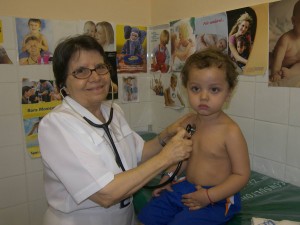Brazil
 click to view powerpoint history
click to view powerpoint history
SMIC Mission in Brazil
Mission in Brazil began before the foundation of the congregation with the arrival of the humble and well educated Friar Amandus Bahlmann, OFM who arrived at the end of the previous century already famous in the Church for his missionary travels. The "missions to his people" were based in a Catholic renewal style that was very successful. The strategy involved river trips going from city to city celebrating Masses, hearing confessions, distributing communion, baptizing and instructing people in the faith. In recognition of his missionary travels, friar Amandus was raised to the Episcopacy in 1908 and appointed prelate of a new "Prelature Nullius" of Santarem, Brazil (created in 1903, the first for this type of mission.) With new responsibilities for a vast diocese in the lower Amazon, Bishop Bahlmann, "Dom Amando" prophetically went seeking the help of Sisters to continue and to expand charitable works, catechetics and evangelization which defined his missionary vision.
Educational Ministry
Santa Clara school was the first SMIC school founded on August 11th 1913 by Mother Mary Immaculate of Jesus and Dom Amando Bahlmann. The purpose of Santa Clara was to first attend to poor children and orphans because of the strong desire on the part of Mother Immaculata to dedicate herself to the cause of education.
The Sisters concretized the mission with much love and faith. They did not fail to give their all to the mission of education. They maintained great firmness and confidence in God, and were determined to work in solidarity to respond to the needs of poor children and youth of Santarem. They did all with conviction and passion for the realization of the Reign of God among the most suffering of the Amazon Region. They lived simply, with the few things available to them at that time and dedicated their whole self with love for their mission.
There are many other examples of works done by the Sisters in education with the same dedication. One such example is the school in Itabaiana.
Throughout 84 years our congregational charism is being lived in our educational ministry at the Immaculate Conception School in Itabaiana. Harmony with the new times requires an interdisciplinary perspective. With this in mind, the Sisters try to concretize a major objective: the transformation of society within the ethical reality of fraternal commitment in the example of our founders Mother Immaculata and Dom Amando who sought to live this relationship on all levels as inspired by the Gospel of our Lord Jesus Christ.
The Sisters continue to nourish the desire to serve the Reign of God by cultivating attitudes of solidarity in giving, creating feelings of belonging, love and commitment to the mission begun by our founders. By taking on the functions confided in them- in this case education, they try with all their strength to zealously and responsibly advance this mission: actualizing themselves as professional educators, attentive to the changes in society and its laws, so as to better correspond to the needs of the times without losing the focus of evangelization .
The Hospital Ministry
From the beginning of her service to the people of Santarem, Mother Immaculata envisioned responding to the physical needs of the people . Soon after her arrival she opened the a clinic. In preparing Sisters for missionary activity, Mother Immaculata made it a point to have the Sisters ready themselves to care for ordinary and unusual illnesses, including the extraction of teeth. Over time, Sisters expanded service into governmental run hospitals (Santa Casas) as well as began their own hospitals in the states of Para, Sergipe, Pernambuco, Bahia.
An example of how the Sisters serve in health care is the Tricentenario Hospital opened in 1955 in Olinda. Founded by Martinho Limper, OFM friar with the help of donations from the Catholic Bishops Conference in West Germany, this visionary, committed to the development of the City of Olinda, Pernambuco, was a great supporter of humanitarian causes and created in 1947 the St. Francis Social Institute to serve social development through the transformation of scientific learning in innovative practices. From the challenges present, he saw the need to found a major project that would attend all expectations. This major project is the Tricentinario Hospital which, since its foundation, has had the support of the Holy Cross Province of the Missionary Sisters. While the number of Sisters serving in the hospital has declined to one, her expertise and presence continues to provide the SMIC dedication long known to the people of the City.
In this post modern time of great changes where globalization requires even more new technologies, qualified technicians, scientific and human resources and where one confronts each day the competitive marketplace, we the Missionary Sisters perceive an even greater need to continue our mission, with our specific charism by seeking partnerships with groups sensitive to responding to those in need. Our present experience of working with Dr. Gil Brasileiro to better strengthen the service of the Hospital is one such way of maintaining our commitment to health care within our own resource limitations.
Another example is the St. Anthony Hospital in Salvador begun in 1949 by Sr. Dulce when she housed her first 70 ill persons in the chicken shed of the Convent of the Sisters. Ten years later, in August of 1959, the Social Works of Sr. Dulce was born. The first decade was marked by the voluntary work of doctors, friends and the unending pilgrimages of Sr. Dulce into the streets for food, medicine and donations for the poor and sick. The lack of adequate structures was compensated by her disposition to serve.
Actually the Hospital of St. Anthony now administered by lay persons, continues the mission left by Sr. Dulce and the charism of the Missionary Sisters which is to Love and Serve the poor and needy by offering gratuitous health care and social assistance, and innovative educational programs.
Another Hospital also named St. Anthony exists in regional service to the people of the Amazon. Begun on October 22nd, 1967 the Beneficient Society of St. Anthony was founded in Alenquer, Para. More than 90% of the hospital's operational capacity is for the use of poor patients using SUS -the national health insurance plan to cover costs for the care of the poor. The Hospital daily must seek means to continue to respond to the medical needs of the region.
Insertion into Pastoral Services
Today, more than 100 years have elapsed and our Congregation continues with this same charismatic vision of defending the marginalized, in attending youth, cultivating the growth of the Reign of God of Justice and Peace, bringing forward the Good News of Jesus in all directions where SMIC are: schools, hospitals, base communities, insertion communities, etc.
Pastoral work is an expansive service including parish ministries, social advocacy and human advancement through skills projects. One example of our engagement in pastoral work is our mission in São Paulo where we work with the marginalized and excluded of society in solidarity with our Franciscan brothers in their organization called SEFRAS which serves "street people", persons with HIV, children, adolescents and their families in educational activities and social services.
Another pastoral work valued for over 100 years is the São Francisco mission with the Munduruku people. It remains a privileged space for our Congregation to accompany the Munduruku who live in a situation of threat by groups whose interest are self serving at the cost of destroying the simple lifestyle and values passed on for generations. Contact from outsiders brought unknown illnesses to them then and even now.
Our first Sisters literally gave their lives so that Munduruku had life. They did not shy away from any challenge to be a compassionate presence in their midst. In early days, the trip from Santarem to the Mission took two months aboard a small boat. No difficulty however was motive for them to desist from their work. The Munduruku welcomed the Sisters as "angels of God" who came to help them. Every sister who throughout the 100 years carried out the essential works of health, education and evangelization forged a relationship of love and trust with the people resulting in respect and having been given the title of "mothers".
In these modern times, the Sisters continue to accompany the people seeking justice in their causes of land rights, preservation of forest and other activities, sharing their conquests and joining in their dreams for a dignified life. Living among the Munduruku is without doubt an opportunity for us to live our charism more radically.
In our ministries in mission to Brazil, we continue the dream of our founders and of our early Sisters to work together with God's people in promoting a future with just, fraternal relationships that are basic and fundamental rights for life.
Continue reading about the Province histories :: USA • Germany • Asia • Namibia • Brazil

